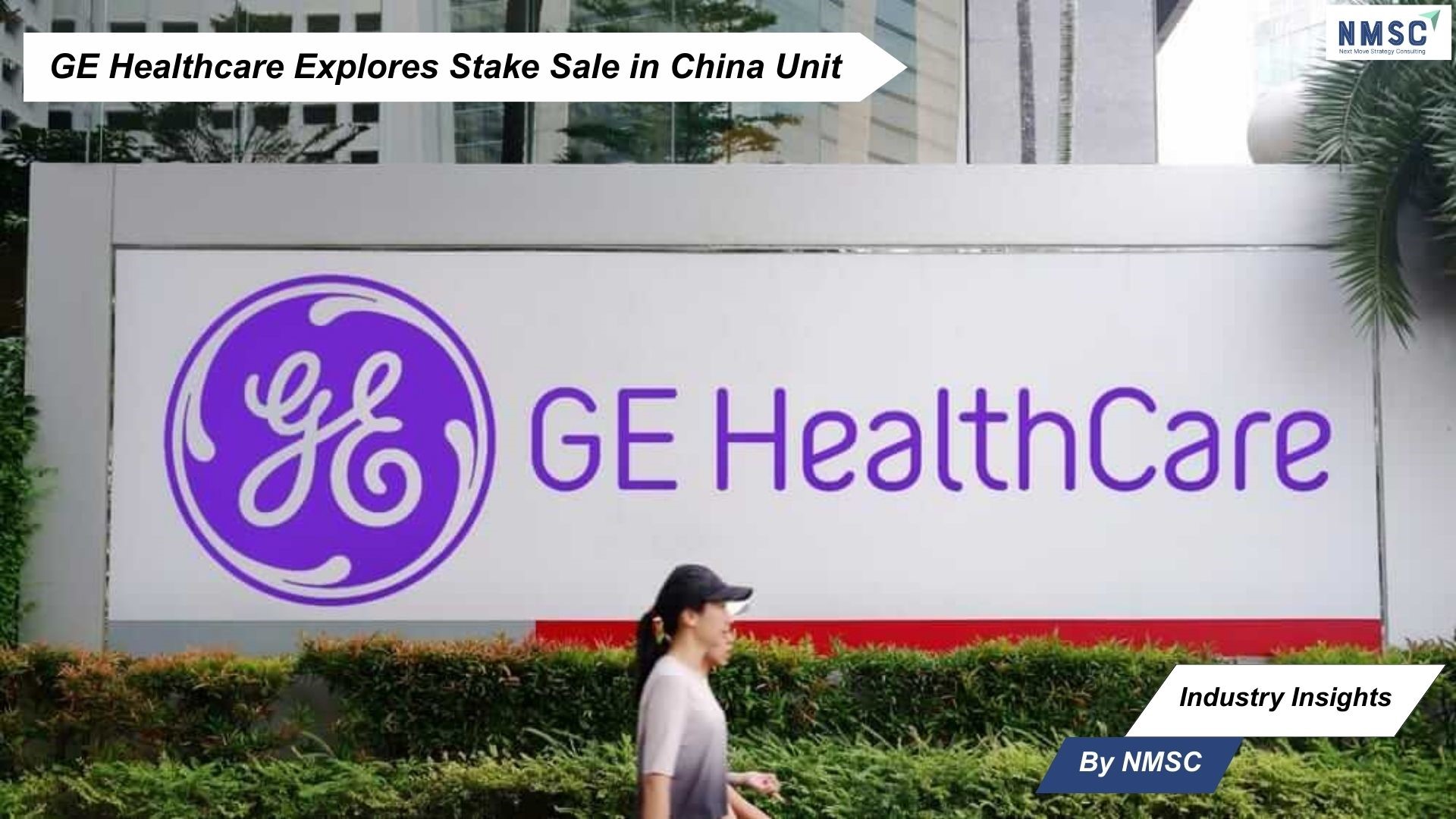GE Healthcare Explores Stake Sale in China Unit
Published: 2025-09-19

Industry Insights from Next Move Strategy Consulting
People familiar with the matter said that GE Healthcare Technologies Inc. is considering options that include selling a stake in its China business.
GE Healthcare Weighs Options for China Unit as Valuation Talks Advance
According to people familiar with the matter, GE Healthcare Technologies Inc., the US-based medical technology firm, has been working with advisers to assess strategic options for its China business. The discussions, which remain confidential, could lead to a potential transaction valuing the assets at several billion dollars.
On Thursday, GE Healthcare shares initially climbed as much as 2.3% in premarket trading but later closed down 3.4%. Year-to-date, the stock has declined 5.4%, giving the company a market capitalization of around $34 billion. Meanwhile, Moody’s Ratings reaffirmed its Baa2 credit rating and maintained a stable outlook for the company.
GE Healthcare Maintains Commitment to China Amid Strategic Review
The people familiar with the matter emphasized that discussions are still at an early stage, and no final decisions have been reached regarding the timing or scale of a potential divestment.
A spokesperson for Chicago-based GE Healthcare declined to provide further details, noting only that the company remains dedicated to supporting patients and customers in China, one of the largest healthcare markets globally.
GE Healthcare Mirrors Global Trend as Firms Reassess China Strategies
If it proceeds, GE Healthcare would be among several multinational companies reviewing their China operations in response to mounting competition from agile domestic players with strong ties to local consumers. Companies weighing a full or partial exit from their China businesses include Starbucks Corp., General Mills Inc.’s Häagen-Dazs, Decathlon SA, and Restaurant Brands International Inc.’s Burger King.
GE Healthcare became an independent entity in 2023 following General Electric Co.’s spin-off of its medical equipment division.
GE Healthcare Faces Revenue Decline in China
GE Healthcare’s portfolio includes imaging systems, ultrasound devices, patient care solutions, and pharmaceutical imaging agents. China, its second-largest market, employs around 7,000 staff, according to the company’s latest annual report.
In 2024, the company generated $2.4 billion in revenue from China, reflecting a 15% year-over-year decline. GE Healthcare attributed the drop to the healthcare sector’s anti-corruption campaign, which led to delayed orders and sales. For the quarter ending in June, revenue from China fell a further 3%.
Impact on the Advanced Healthcare Market
Strategic Realignment and Market Access
GE Healthcare’s exploration of a stake sale in China signals a strategic realignment that could reshape partnerships and collaborations in the advanced healthcare space. While the move may bring fresh capital and new joint ventures, it also raises questions about long-term continuity for hospitals and research institutions relying on GE’s advanced technologies.
Potential Impacts:
Positive:
-
Infusion of new investment could accelerate innovation in imaging and diagnostic solutions.
-
Local partnerships may strengthen market adaptation to China’s healthcare policies and patient needs.
-
Shared ownership may open doors for faster regulatory clearances and better access to domestic procurement programs.
Negative:
-
Strategic uncertainty may cause hospitals to delay purchases of advanced technologies until ownership clarity emerges.
-
Reduced direct involvement from GE could slow rollout of next-generation healthcare innovations in China.
-
Competitive pressure from local firms may intensify, challenging GE’s ability to retain premium market share.
Impact on the Medical Equipment Market
Supply Chain, Competition, and Investor Sentiment
The medical equipment market, particularly in China, is highly sensitive to regulatory shifts, pricing dynamics, and foreign investment strategies. A partial or full divestment by GE Healthcare could alter competitive balance, benefiting domestic firms while introducing uncertainties for multinational suppliers.
Potential Impacts:
Positive:
-
Greater involvement of local stakeholders may improve distribution efficiency and customer support.
-
Opportunity for domestic medical equipment manufacturers to strengthen their presence and secure government-backed contracts.
-
Investors could view the stake sale as a risk-mitigation measure, helping stabilize GE Healthcare’s global financial position.
Negative:
-
Possible disruption in supply chain continuity if operations are restructured during the transition.
-
Risk of declining trust among hospitals and clinics reliant on GE’s equipment, leading to competitor gains.
-
Heightened regulatory scrutiny could complicate deal execution, slowing product availability in China.
Summary of Market Impact:
-
Advanced Healthcare Market: Mixed outlook—potential for enhanced local partnerships but risk of delayed adoption of GE’s advanced technologies.
-
Medical Equipment Market: Likely short-term negative pressure due to uncertainty and competition, but long-term opportunity for local players and possible financial stabilization for GE globally.
Conclusion
GE Healthcare’s potential stake sale in its China unit reflects both the challenges and opportunities facing multinational firms in one of the world’s largest healthcare markets. While the move could unlock new partnerships and capital, it also highlights intensifying competition from local players and regulatory headwinds. With revenues under pressure, the outcome of these strategic discussions will be pivotal in shaping GE Healthcare’s growth trajectory in China and its broader global positioning in the medical technology sector.
Source: Bloomberg
Prepared by: Next Move Strategy Consulting
About the Author
 Karabi Sonowal is an experienced SEO Executive and Content Writer in digital marketing. She excels in SEO, content creation, and data-driven strategies that boost online visibility and engagement. Known for simplifying complex concepts, Karabi creates impactful content aligned with industry trends.
Karabi Sonowal is an experienced SEO Executive and Content Writer in digital marketing. She excels in SEO, content creation, and data-driven strategies that boost online visibility and engagement. Known for simplifying complex concepts, Karabi creates impactful content aligned with industry trends.
About the Reviewer
 Debashree Dey is a skilled Content Writer, PR Specialist, and Assistant Manager with expertise in digital marketing. She creates impactful, data-driven campaigns and audience-focused content to boost brand visibility. Passionate about creativity, she also draws inspiration from design and innovative projects.
Debashree Dey is a skilled Content Writer, PR Specialist, and Assistant Manager with expertise in digital marketing. She creates impactful, data-driven campaigns and audience-focused content to boost brand visibility. Passionate about creativity, she also draws inspiration from design and innovative projects.
















Add Comment